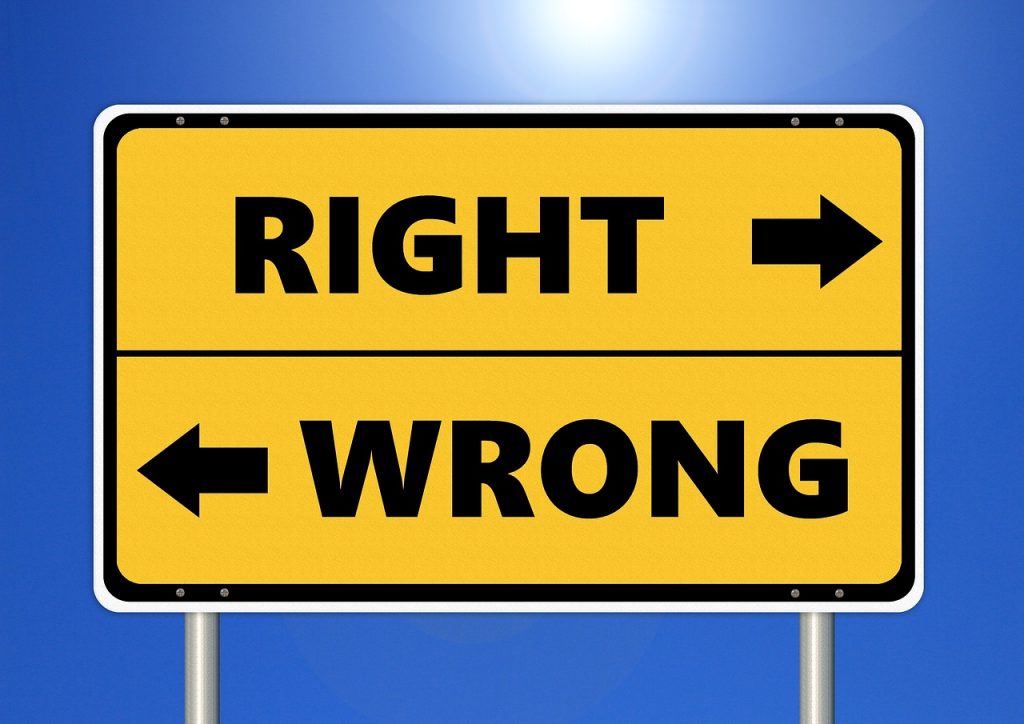In today’s fast-paced world, decision making can often feel overwhelming. We are faced with countless choices every day, from what to eat for breakfast to major life decisions. But have you ever stopped to ask yourself how your personal values play a role in your decision-making process? Our personal values are the core principles that guide our behavior and actions, and when they are not aligned with the choices we make, it can lead to feelings of dissatisfaction and inner conflict. In this article, we will explore the importance of ensuring alignment between your personal values and decision making, and how this can ultimately lead to a greater sense of fulfillment and harmony in your life. So, let’s dive deep into the world of decision making and personal values, and discover how you can make choices that are true to yourself.

This image is property of pixabay.com.
The Importance of Personal Values in Decision Making
When it comes to making decisions, we often rely on a variety of factors such as logic, reason, and practicality. However, one aspect that is often overlooked but holds immense significance is our personal values. Personal values are the principles and beliefs that guide our thoughts, actions, and behaviors. They are deeply ingrained within us and play a crucial role in shaping our identity and decisions. Understanding and aligning with our personal values is key to making authentic, fulfilling choices that lead to a life of harmony and happiness.
Understanding personal values
To begin the journey of aligning personal values with decision making, it is important to first understand what personal values are. Personal values can be thought of as a compass that directs our actions and choices. They are the fundamental principles and beliefs that define who we are as individuals. These values can encompass a wide range of aspects, including our integrity, honesty, compassion, creativity, and more. Personal values serve as a guide to living a purposeful and meaningful life, enabling us to make choices that are in line with our beliefs.
The role of personal values in decision making
Personal values play a crucial role in the decision-making process. They act as a filter through which we evaluate different choices and assess the potential outcomes. Our values serve as a foundation for making decisions that align with our sense of self and what we believe to be right and wrong. When our decisions are in accordance with our values, we experience a sense of authenticity and fulfillment. On the other hand, making decisions that go against our values can lead to feelings of regret, dissatisfaction, and inner conflict.
Why alignment with personal values is crucial
Aligning our decisions with our personal values is crucial for several reasons. Firstly, it enhances our overall well-being. When our actions are in alignment with our values, we experience a deep sense of congruence and inner harmony. This alignment allows us to live authentically and with integrity, leading to greater satisfaction and contentment in life. Additionally, when our decisions are rooted in our values, we are more likely to achieve our goals and aspirations, as they are driven by a deeper sense of purpose and meaning. Finally, aligning with our personal values cultivates stronger relationships with others, as our actions are more genuine and authentic, leading to a greater sense of trust and connection.
Identifying Your Personal Values
In order to align our decisions with our personal values, it is essential to first identify what those values are. Here are some approaches to help you discover and clarify your personal values:
Self-reflection and introspection
Self-reflection is a powerful tool for gaining insight into our values. Take some time to think deeply about what is truly important to you. What principles do you hold dear? What beliefs guide your actions? Consider specific situations or experiences that have had a significant impact on your life and try to identify the underlying values that were at play. Journaling or engaging in mindfulness practices can also aid in this process of self-discovery.
Values assessment exercises
There are numerous values assessment exercises available that can help you identify and prioritize your personal values. These exercises typically involve a series of questions or statements that prompt you to evaluate the importance and relevance of various values in your life. By completing these assessments, you can gain a clearer understanding of the values that resonate most deeply with you.
Seeking feedback from trusted individuals
Sometimes, it can be helpful to seek feedback from trusted individuals who know you well. Ask friends, family members, or mentors to share their perspective on what they believe your personal values to be. Often, they can provide valuable insights and help you recognize values that you may not have been aware of.

This image is property of pixabay.com.
The Impact of Personal Values on Decision Making
Once you have a clear understanding of your personal values, it’s important to recognize the impact they can have on your decision-making process. Here are some ways in which personal values influence decision making:
Clarity in decision making
When you are aware of and aligned with your personal values, decision making becomes clearer. Your values act as a guiding light, offering clarity and direction. They provide a framework for evaluating different options and help you make choices that are in line with your beliefs and principles. This clarity eliminates the confusion and uncertainty that can often accompany decision making.
Reducing decision-making stress
Decision making can be stressful, especially when faced with complex or difficult choices. However, when your decisions are rooted in your personal values, it can alleviate some of this stress. Knowing that your choices are authentic and aligned with what you hold dear provides a sense of confidence and peace of mind.
Enhancing overall well-being
Making decisions in alignment with your personal values ultimately enhances your overall well-being. When you consistently make choices that reflect who you truly are and what you believe in, you experience a deep sense of fulfillment and satisfaction. Aligning with your values allows you to live a more meaningful and purpose-driven life, which in turn positively impacts your mental, emotional, and even physical well-being.
The Process of Aligning Personal Values with Decision Making
Aligning personal values with decision making is an ongoing process that requires conscious effort and reflection. Here’s a step-by-step guide to help you align your decisions with your values:
Articulating personal values
Take the time to articulate and define your personal values. Write them down in a clear and concise manner. This act of articulation helps solidify your values and serves as a reminder of what is truly important to you. Refer back to this list whenever you are faced with a decision to ensure that your choices are aligned with your values.
Evaluating choices based on values
When faced with a decision, evaluate each choice based on how well it aligns with your personal values. Ask yourself if the choice is in harmony with your beliefs, principles, and long-term goals. Consider how each option will impact your overall well-being and sense of authenticity.
Making tough decisions in alignment with values
There may be times when you are faced with tough decisions that require sacrificing or compromising certain values. In such situations, it’s important to carefully weigh the risks and rewards associated with each choice. Consider the long-term implications and whether the decision aligns with your core values and principles. Assess whether the potential outcome is worth the temporary compromise and whether there are alternative solutions that better align with your values.

This image is property of pixabay.com.
Overcoming Challenges in Aligning Personal Values with Decision Making
Aligning personal values with decision making can be challenging at times, especially when faced with conflicting values, external pressures, or fear of judgment. Here are some strategies to help overcome these challenges:
Conflicting values
Conflicting values occur when we are torn between two or more principles that are important to us. In such cases, it’s important to assess the root cause of the conflict and explore potential compromises or solutions that incorporate elements of both values. Seek guidance from trusted individuals or professionals who can provide a fresh perspective and help you navigate these conflicting values.
External pressures
External pressures, such as societal expectations or the influence of others, can sometimes cloud our judgment and lead us to make decisions that are not in alignment with our personal values. To overcome this challenge, it’s important to cultivate self-awareness and develop the confidence to stay true to yourself. Remind yourself of your core values and the reasons why they are important to you. Surround yourself with supportive individuals who respect and encourage your values.
Fear of judgment or criticism
Making decisions in alignment with our personal values can sometimes lead to judgment or criticism from others. It’s important to remember that everyone has their own set of values and beliefs, and not everyone will understand or agree with your choices. Develop resilience and inner strength by focusing on your own growth and happiness. Seek support from like-minded individuals who can provide encouragement and guidance.
Strategies for Enhancing Alignment with Personal Values
Enhancing alignment with personal values requires consistent effort and self-awareness. Here are some strategies to help you strengthen your alignment:
Prioritizing self-awareness
Self-awareness is an essential component of aligning with personal values. Take the time to reflect on your experiences, thoughts, and emotions. Regularly assess whether your actions and decisions are in line with your values. Engage in practices such as journaling, meditation, or therapy to deepen your self-awareness and understanding of your values.
Setting clear goals based on values
Setting goals that are rooted in your personal values can provide a sense of direction and purpose. Clarify what you want to achieve in different areas of your life and ensure that these goals align with your values. Use your values as a guide when making decisions related to your goals, and regularly evaluate your progress to ensure continued alignment.
Creating an action plan for decision making
Develop an action plan for making decisions that align with your personal values. This plan can include specific strategies or steps to follow when faced with choices. For example, you may decide to take a moment of reflection before making a decision or seek input from trusted individuals. Having a plan in place can help you navigate decision making with greater intention and alignment.
Adapting Personal Values in the Decision-Making Process
While personal values provide a stable foundation for decision making, it’s important to recognize that values can evolve and change over time. Here are some considerations for adapting personal values in the decision-making process:
Flexibility in values
Personal values are not set in stone and can evolve as we grow and learn. It’s important to remain open and flexible to reevaluating and adapting our values when necessary. Allow space for personal growth and be willing to embrace new perspectives and experiences that may challenge existing values.
Reevaluating values over time
Regularly reassess your personal values to ensure they are still meaningful and relevant to your life. Life experiences, maturity, and new insights can lead to shifts in values. Take the time to reflect on whether your current values still resonate with who you are and what you believe.
Adopting growth-oriented values
Consider adopting growth-oriented values that prioritize personal development and learning. These values can help foster resilience, adaptability, and a willingness to embrace change. Embracing growth-oriented values allows us to continuously evolve and align our decisions with our evolving sense of self.
The Role of Empathy in Aligning Values and Decision Making
Empathy plays a vital role in aligning values and decision making, not only with ourselves but also with others. Here are some ways in which empathy impacts the alignment process:
Understanding the values of others
Empathy allows us to understand and appreciate the values of others. By putting ourselves in someone else’s shoes, we can gain a deeper insight into their values and perspectives. This understanding helps facilitate effective communication and collaboration, enabling us to find common ground when making decisions collectively.
Finding common ground
When faced with decisions involving multiple individuals, it’s important to find common ground that respects the values of all parties involved. Empathy allows us to bridge differences and seek compromise or solutions that honor everyone’s values to the best extent possible. Finding common ground promotes inclusivity and strengthens relationships.
Respecting diverse perspectives
Empathy encourages us to respect and appreciate diverse perspectives and values. It allows us to approach decision making with an open mind and consider a wide range of viewpoints. By valuing and respecting diversity, we create an inclusive environment that encourages collaboration and innovation.
Consequences of Ignoring Personal Values in Decision Making
When personal values are ignored in the decision-making process, several negative consequences can arise. Here are some potential outcomes of disregarding personal values:
Regret and dissatisfaction
Making decisions that go against our personal values often leads to regret and dissatisfaction. When our actions do not align with what we believe to be right or important, we experience a sense of dissonance and inner conflict. This can ultimately result in feelings of regret and a lack of fulfillment.
Lack of authenticity
Ignoring personal values can also lead to a lack of authenticity. When our choices are not guided by our true beliefs and principles, we may feel like we are living a life that is not aligned with who we truly are. This can create a sense of inauthenticity and a disconnection from our core self.
Strained relationships
Disregarding personal values can strain relationships with others. When our decisions are not aligned with our personal values, it can lead to a lack of trust, misunderstandings, and conflicts with those around us. Relationships thrive when there is alignment and compatibility in values, and ignoring personal values can create tension and distance.
Seeking Support in Aligning Personal Values with Decision Making
Aligning personal values with decision making is not always an easy process, and it can be helpful to seek support. Here are some avenues for seeking assistance in this journey:
Working with a coach or mentor
Engaging the services of a coach or mentor who specializes in personal development and values can provide invaluable guidance. They can help you explore your values, identify any potential conflicts, and support you in making decisions that align with your authentic self.
Joining a support group or community
Joining a support group or community of individuals who share similar values can offer a sense of belonging and encouragement. Discussing different perspectives and sharing experiences with like-minded individuals can enrich your understanding of your values and provide support in aligning them with your decisions.
Developing a personal accountability system
Creating a personal accountability system can help you stay on track with aligning your decisions with your values. This can involve setting goals, tracking your progress, and regularly reflecting on how well your choices align with your values. You can also enlist an accountability partner who can provide support and hold you accountable in your decision-making process.
In conclusion, personal values are an integral part of decision making, shaping the choices we make, and ultimately influencing our well-being and authenticity. By understanding and aligning with our personal values, we can navigate the decision-making process with greater clarity, reduce stress, and live a life that is truly in harmony with ourselves and others. It is a journey that requires self-reflection, flexibility, and the willingness to seek support when needed. Embracing personal values in decision making is a transformative step towards living a purposeful and fulfilled life.


